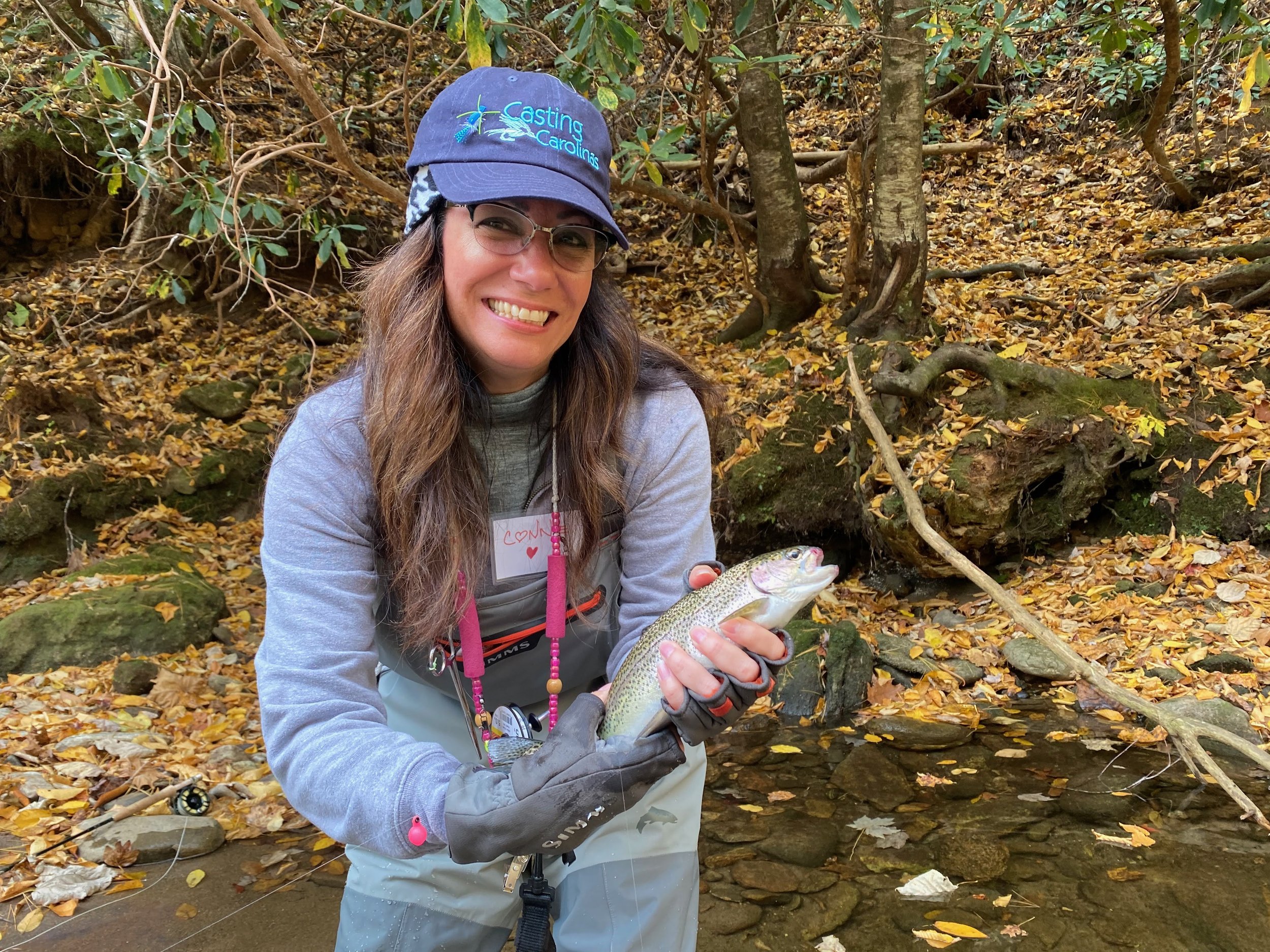Casting Carolinas Creates a Ripple Effect of Healing for Women Experiencing Cancer
By Meg Hale Brunton, Photos Courtesy of Casting Carolinas
Casting Carolinas’ Executive Director Starr Nolan grew up on the river. A lover of the outdoors, sports, and music, one of her favorite things to do was walk up and down the water. “Still my favorite things,” she says. She also had a love of music. Starr began playing the piano at the age of five and went on to pursue a college education. After her Freshman year, she decided to switch to an English degree. “Then I discovered it was a degree in Unemployment,” she says, joking. Starr went back to school and earned her Master’s degree in Social Work and started a private practice. While working in social work, she had several friends and family members who were touched by cancer. Starr became passionately interested in addressing issues surrounding the disease.
The idea for a nonprofit that combined the joy of fly-fishing and healing from cancer was the next step for her. She started the nonprofit organization Casting Carolinas in 2015. She describes the combination of working with the trauma that is a cancer diagnosis and fly-fishing as a perfect fit. Casting Carolinas offers a series of free fly-fishing retreats for women of all ages, with all types of cancer, and at any stage of cancer. The women work with instructors and relate with one another to discover empowerment and healing both in nature and with each other. In her role as Executive Director, Starr says she does everything from applying for permits, to program development, to washing off dirty wading boots.
At the retreats, the healthy components of nature are combined with the evidence-based skills for coping and healing. “Fly fishing is such an amazing learning experience,” Starr says. “There’s never a dull moment. You’re always trying to work it out, and learn the river, and understand nature.” Starr explains that Casting Carolinas’ Retreat Model, included in all their activities, is what sets them apart. It is based on the acronym F.L.O.W. and is designed to help people who are reeling from a cancer diagnosis. Casting Carolinas F.L.O.W. stands for: (F) Find your breath, (L) Look inward, (O) Open up and Observe, (W) What’s next?.
Casting Carolinas Participant Angela Evans says the retreat weekend she attended in 2020 was foundational for her, and taught her skills she still uses today. “Cancer tells you there’s so much you can’t do. In the stream, you can do whatever you want to and that’s very powerful,” she says about her experience.
Angela feels she was in a lot of denial about her own cancer diagnosis and didn’t like to talk about it. She dreaded the group meetings at Casting Carolinas until she attended her first one and found that they were focused on healing and full of positivity. “It’s not everybody sharing their sad stories, not dwelling on cancer. It was such a special time for me. It gives you a sisterhood of people to share that with, and that supports you after you leave.”
“The retreats are all about stepping outside your comfort zone,” Starr explains, sharing that many women sign up for the retreats but profess hesitancy to touch a fish, or even step in the water. Starr makes it clear that the instructors don’t push the attendees to do anything they don’t want to do at the retreats, but somehow, all the participants have gotten in.
The retreats are held at St. Christopher Camp and Retreat Center in John’s Island, South Carolina, or on Lake Logan in North Carolina. Casting Carolinas hosts three retreats per year in March, April and October. At the retreats, sixteen women come together to work with highly-qualified instructors on knot-tying, casting a fly rod, and learning to listen to the river. There is also a health and wellness instructor on staff, as well as a psycho-social director and a retreat leader.
“Fly fishing has always been a traditionally male sport, but more women are getting involved in it,” Starr explains, citing that of all the fishermen featured in the Southern Fly Fishing Hall of Fame, only four of them are women, and every one of those women are instructors with Casting Carolinas. She adds that Casting Carolinas is proud to boast over 250 alumni, many of whom have returned to volunteer with the organization. Starr shares that they are deeply grateful to their generous supporters, and that their ability to offer retreats depends entirely on donations.
“Quality of life is so important,” says Angela. “You have doctors that treat your body, but don’t think about making your spirit well.” When cancer had Starr at her lowest point, she rediscovered her happiness and joy through Casting Carolinas. Starr says she feels great pride when women who have been on her retreats tell her that it not only helped them, but also their families, because they conquered their fears in the river and brought that conquest home with them.
To learn more about Casting Carolinas, or to volunteer or make a donation today, visit their website: www.castingcarolinas.com






